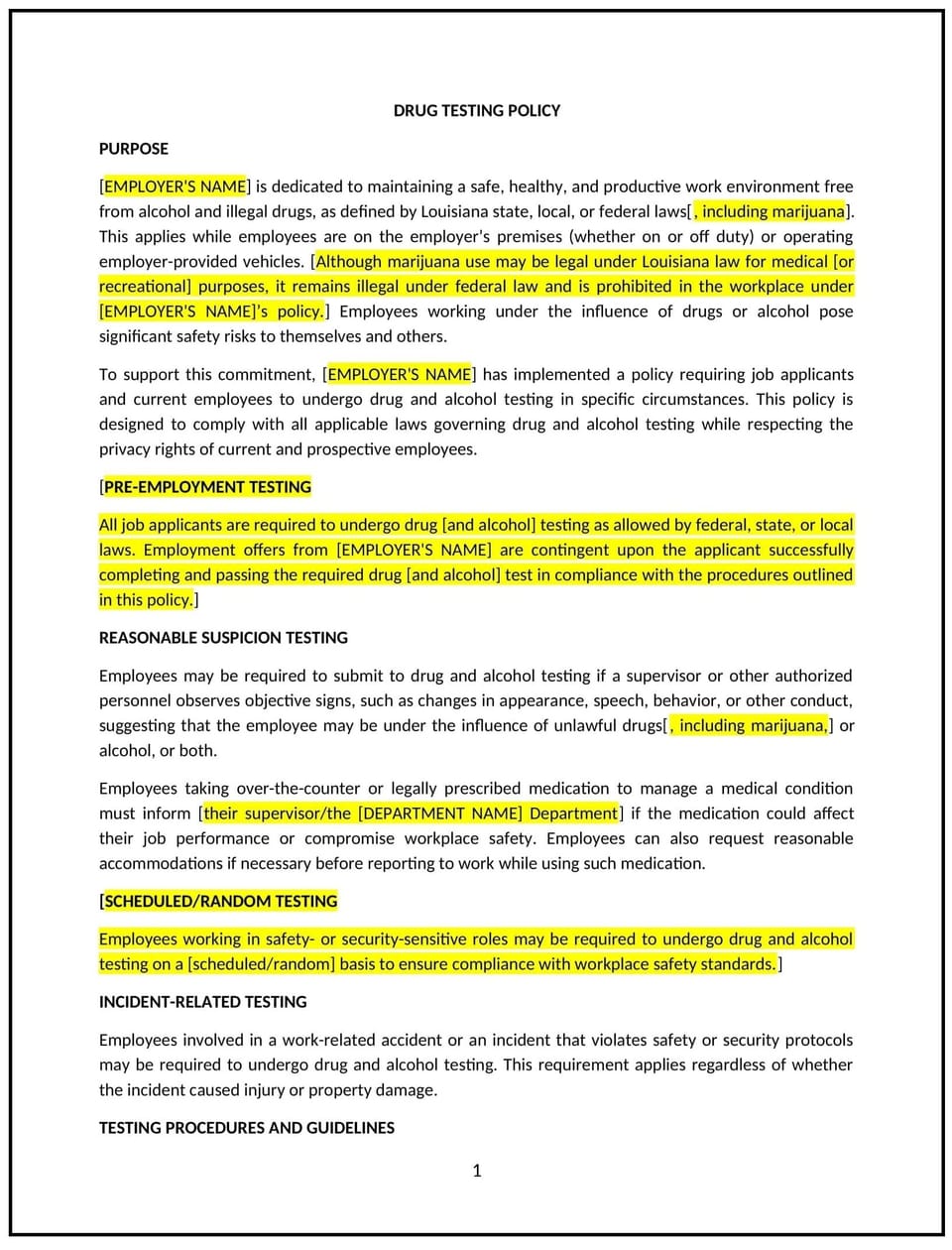Drug testing policy (Louisiana): Free template

Drug testing policy (Louisiana)
This drug testing policy is designed to help Louisiana businesses establish clear procedures for conducting workplace drug testing. It outlines the types of testing, circumstances under which testing occurs, and the steps to handle positive results, creating a safe and productive work environment.
By implementing this policy, businesses can minimize safety risks, maintain operational integrity, and promote accountability.
How to use this drug testing policy (Louisiana)
- Define testing types: Specify the types of drug testing conducted, such as pre-employment, random, post-incident, or reasonable suspicion testing.
- Identify covered employees: Clarify which roles or departments are subject to drug testing based on job responsibilities or safety considerations.
- Outline testing procedures: Provide details on how tests will be conducted, including notification, sample collection, and testing methods.
- Address confidentiality: Emphasize that all test results will be handled confidentially and shared only with authorized personnel.
- Communicate consequences: Clearly state the actions that will be taken in the event of a positive result, such as suspension, rehabilitation programs, or termination.
- Include appeal processes: Offer employees the option to challenge test results or provide additional context if needed.
Benefits of using a drug testing policy (Louisiana)
Implementing this policy provides several advantages for Louisiana businesses:
- Promotes workplace safety: Reduces the risks associated with impaired performance in safety-sensitive roles.
- Enhances productivity: Helps maintain a focused and efficient workforce.
- Clarifies expectations: Establishes clear standards for substance use and its impact on employment.
- Protects confidentiality: Demonstrates respect for employee privacy through secure handling of test results.
- Reflects Louisiana-specific considerations: Aligns with local workplace norms and operational requirements.
Tips for using this drug testing policy (Louisiana)
- Be transparent: Communicate the policy and its purpose clearly to all employees during onboarding or policy updates.
- Train managers: Equip supervisors to identify reasonable suspicion and handle testing-related discussions appropriately.
- Use certified testing facilities: Partner with reputable labs to ensure accurate and reliable test results.
- Provide resources: Offer access to employee assistance programs (EAPs) or rehabilitation support for employees who test positive.
- Review regularly: Update the policy to reflect changes in Louisiana regulations, workplace needs, or industry standards.
Q: What types of drug testing are typically included in this policy?
A: Common types include pre-employment, random, post-incident, and reasonable suspicion testing, as outlined by the business.
Q: How should businesses handle positive test results?
A: Businesses should follow a clear process, such as notifying the employee, offering rehabilitation resources, or taking disciplinary action based on the policy.
Q: Are all employees subject to drug testing?
A: Drug testing may be limited to specific roles or departments, particularly those involving safety-sensitive tasks.
Q: How can businesses protect employee confidentiality during drug testing?
A: Test results should be securely stored and shared only with authorized personnel involved in the process.
Q: What steps can employees take if they disagree with a test result?
A: Employees can appeal by requesting a retest or providing additional context, such as proof of prescribed medication.
Q: How often should this policy be reviewed?
A: The policy should be reviewed annually or whenever there are updates to Louisiana regulations or workplace requirements.
Q: What resources are available for employees who test positive?
A: Businesses can offer access to employee assistance programs (EAPs), rehabilitation services, or counseling to support employees in addressing substance use issues.
This article contains general legal information and does not contain legal advice. Cobrief is not a law firm or a substitute for an attorney or law firm. The law is complex and changes often. For legal advice, please ask a lawyer.


